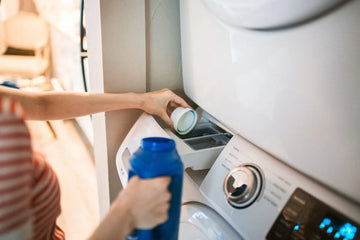Laundry detergent is a simple product that can be very confusing. With so many options on the market, it’s difficult to know what dosage you need or how much detergent you should use. This article will help walk you through different factors that make up how much laundry detergent to use in your home and what dosage might work best for your family's needs!
How Do I Know I’m Using Too Much Laundry Detergent?
Too many suds. If you see lots of suds at the bottom of your washing machine during the wash cycle, then there's likely too much soap in your load (and probably not enough water). You should also check for suds when handwashing clothes—if there are bubbles on the surface of a sink filled with warm water then it means there's excess detergent still lingering on those garments!
How Do I Know I’m Using Too Little Laundry Detergent?
If you’re not using enough laundry detergent, your clothes won’t be clean. They may also not be soft or have a bad smell to them. You may notice they are faded, stained or stiff. Additionally, they could have a lot of static in the fabric that causes them to cling together and get stuck in the dryer or on other garments when you try to remove them from the washer or dryer.
How Much Laundry Detergent To Use?
When it comes to laundry detergent, you should use the recommended dose. If your clothes are clean and soft, you can use less detergent; if they are dirty and hard to clean, use more.
Load Size
The amount of detergent you use should be based on the size of the load. For smaller loads, you’ll need less detergent than for larger ones. As a general rule, you can double the amount of water in your machine and use at least that much detergent.
Machine Type
Once you know the type of machine you have, it's time to figure out how much detergent to use. There are several different types of washing machines, but they all come with their own instructions on how much detergent to use.
Front-loaders: Use 1/2 cup of detergent for each large load. This can be increased for very dirty loads or when using cloth diapers or baby clothes (1 cup).
Top-loaders and high-efficiency machines: Measure out 2 tablespoons per small load (1/4 cup for a large load) or 3 tablespoons per medium load. If your machine is HE and has an HE symbol, add approximately 2 tablespoons more than usual if you're washing a full tubful of clothes that aren't especially dirty—but go lightly on the soap here because too much can leave residues on clothing that could cause fading over time. For extra-dirty loads, increase this amount slightly by an additional tablespoon or two (3/4 cup total).
Water Hardness
Water hardness is a factor in detergent dosage. If you have hard water, you'll need to use more detergent than if you have soft water. Households with hard water will require around 1 tablespoon of HE liquid detergent per load, whereas families with soft water can get by using just ¾ tablespoon per wash cycle
Dirty Clothes
If your clothes are too clean, the detergent will not have enough dirt to suspend in. If they are too dirty, then they will stick to each other and form clumps that will eventually tear apart in the wash cycle.
So how do you know if your clothes need washing? If a piece of clothing has an odor or stain, but is otherwise clean (i.e., it doesn’t look like something died on it), then it can go straight into the washer without being pre-treated with bleach or detergent first.
Type of Formula
Some people may be sensitive to the ingredients in detergents, but if you're not, you can use whichever type is more convenient for your lifestyle. Liquid detergents are typically more expensive than powders. If you have sensitive skin, however, liquid detergents may be preferred because they don't contain dyes or perfumes that can irritate skin and cause allergic reactions in some people.
How much detergent should I use?
Liquid detergent: One tablespoon per load
Powder detergent: One teaspoon per load (or more if your machine is a front loader) If you're using a concentrated formula, follow the manufacturer's recommendation for dosage.
Liquid Detergent
Liquid detergent dissolves faster than powder detergent, and is therefore more concentrated. It's also less likely to leave residue on clothes. These two properties make liquid detergents ideal for front loaders, which use machines that require more water in order to work properly.
Powder Detergent
Powdered detergent is more concentrated than liquid. A small amount of powder can be used to produce a full load of clean laundry, and therefore, it’s best suited for small loads. It’s also ideal for large loads because you don’t have to use as much water or electricity as you would with a liquid detergent.
Can I Put Detergent On Top Of Clothes?
You can put detergent in the washer, but you should never put it directly on top of your clothes. The detergent is meant to be mixed with water and distributed throughout the machine during its cycle.
Conclusion
The amount of detergent to use will depend on the type of formula and the load size. You should always follow the instructions on your laundry detergent as they are designed to get your clothes clean while using less product. If you aren’t sure how much detergent to use then it is best if you start with a small amount first before adding more depending on how dirty your clothes are and how big or small they are as well as what type of machine type you have at home such as front loaders vs top loaders etcetera





